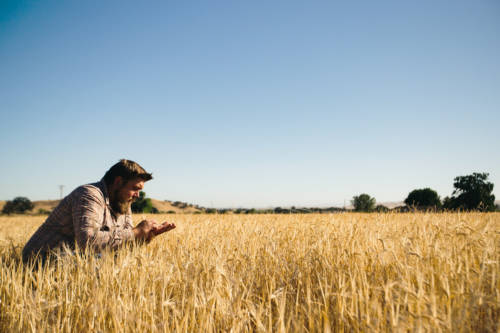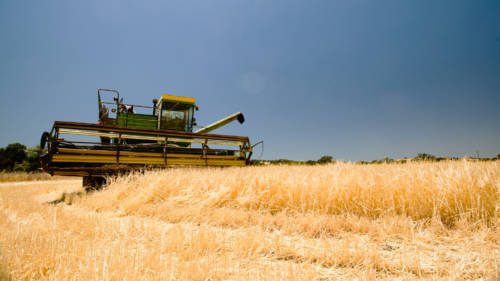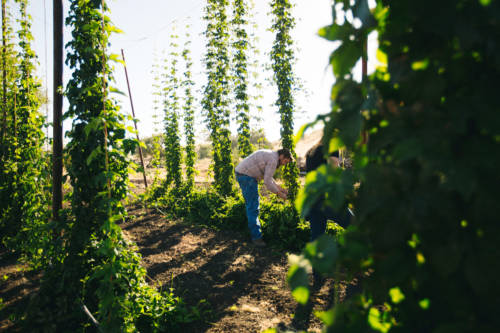
Smoke Mountain Is Brewing Beer with Meyer Lemons, Roses, and Blueberries in Mind
On Rincon Mountain in Ventura, California there’s a brewery and winery that sits on a plush 150-acre avocado ranch. Edward Darren Siple was born and raised here, and it’s where he currently resides with his wife and fellow co-owner of Smoke Mountain, Jill. In addition to growing avocados, the Siple’s grow Meyer lemons and macadamia nuts. Drive a bit further north to Creston, California— near Paso Robles— and you will arrive at their six acre vineyard. At this space, they currently have four acres dedicated to barley, approximately an acre for their hops, and 44 additional acres filled with possibilities of one day providing natively-grown estate wines and beers.
“Producing estate wine and beer gives us complete control of the ingredients that go into our final products,” Jill explained of her and her husband’s ambition. “We can control how they’re harvested, stored, fermented, aged, bottled, labeled, marketed, and sold to the final consumer,” she points out. “On top of this, we can ensure that our final product flavors and aromas are unique to our terroir [the unique environmental factors affecting this region]. This can then help to educate people on what our local growing conditions can do to effect flavors in our beer and wine.”
Edward Darren, who runs about 80 percent of the growing operation, studied Wine & Viticulture at Cal Poly San Louis Obispo. In 2015, he and Jill launched their quarterly beer club shipments which quickly became maxed out at 75 members distributing mostly to San Fransisco, Santa Barbara, and Los Angeles. One of their first releases in the Fall of 2015 was a Honey Lavender Blonde, brewed with Santa Barbara honey and lavender. Smoke Mountain has since established a larger brewing system to keep up with the demand, which in turn has allowed 75 additional thirsty Californians to sample their seasonal offerings.
Edward Darren starts his day by delegating duties to his team before embarking on one of his many tasks in the brewery/winery– including barrel tastings, lab analysis, brewing, monitoring fermentations, as well as cleaning and maintaining the equipment. On the farming front: Avocados are harvested twice a year, spring and summer, which is roughly the same for Smoke Mountain’s lemons. These lemons are then used to make the brewery’s Saison de Citron (a Spring release brewed with black peppercorn). Leftovers are sold to local packing houses, which in turn sell them to retail outlets.
Macadamia nuts are harvested in the fall, then placed in sun trays to cure for one year. Usually during a winter storm, they are cracked, roasted, and sold at the Santa Monica Farmer’s Market. This fall, Smoke Mountain will release a Coconut Macadamia Nut Milk Stout to their members. As for the hops, due to limited production they are not selling this crop to local brewers as all have been accounted for in their own beers and ciders (however, as more hops are planted this is a likely succession). Another crop they proudly grow are grapes, which were picked for the first time this year. (Smoke Mountain hopes to offer wine in the Spring of 2017— contingent upon how they age within the barrels.)
In Smoke Mountain’s summer shipment— themed red, white, and blue for Fourth of July— they released a Blueberry Golden Ale. “We found that we needed to add more blueberries, then we originally thought to let the blueberry flavor shine through,” Jill explained. “We also found that the blueberries gave off more of a purple hue to the beer than the blue color we were aiming for. After some research we found a thai flower that naturally adds a blue color to the beer when steeped. In the end, though, the color turned out to be more of a deep purple– which was still pretty cool. The blueberries were purchased from Whitney Ranch in Carpinteria.”
All of the beers have an underlying theme of farming to yield a product with purpose. From the floral notes in their Saison Du Vin to the rose hips sourced from Mountain Rose Herbs for their White Ale with Rose, their estate and flagship beers will continue to grow in spades. (They even have five beehives!) “Ideally, we would love to have a tasting room on the farm to showcase where the ingredients were grown, harvested, and brewed,” Jill adds.
In the meantime, as they ship new reveals to customers they ask that they not only take into account seasonal ingredients, but also enjoy them with friends and family over seasonal activities. With this, Smoke Mountain is doing something truly remarkable– all the while remaining shepherds of the yeast.




































